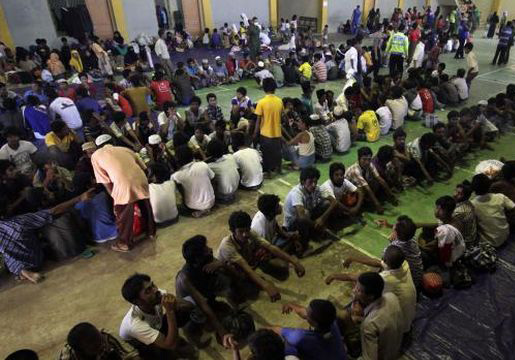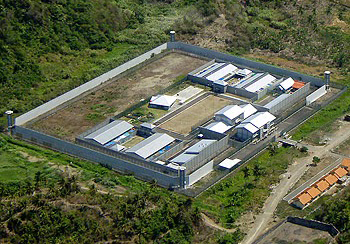
May 15, 2015 | News
The ICJ today condemned the conviction of six human rights defenders after an unfair trial lasting less than five minutes. The six were charged in connection with their participation in a peaceful demonstration against the fatal shooting of a protestor in Letpadaung.
They were sentenced to four years and four months in prison with hard labour.
“Under both international and Myanmar law, a fair trial means independent judges, the need for evidence of guilt beyond a reasonable doubt, and due process. All of these requirements were ignored in the case of these accused, who must be immediately and unconditionally released,” said Sam Zarifi, the ICJ’s Regional Director for Asia and the Pacific.
“Instead of prosecuting peaceful protestors, the Myanmar government must hold those responsible for the killing in Letpadaung accountable and provide justice,” he added.
The ICJ attended today’s hearing at the Yangon Dagon Township Court of Daw Naw Ohn Hla, Daw Sein Htwe, U Nay Myo Zin, Ko Tin Htut Paing, Daw Lay Lay @ Daw San San Win and U Than Swe, who were sentenced for violating Article 18 of the Peaceful Assembly and Peaceful Procession Law, as well as a series of offences under the Penal Code.
These offences include assaulting or preventing a public servant from the discharge of his duty (Section 353); rioting (Section 147); publishing or circulating information which may cause public fear or alarm and may incite persons to commit offences “against the State or against the public tranquility” (Section 505(b)).
It is unclear whether an appeal will be filed, but the ICJ understands that the accused’s appeal in this case would be highly unlikely to succeed.
The ICJ has observed and documented the case’s pre-trial and trial phases and considers that they grossly violate international standards of fair trial.
Bail has been denied to all the accused after hearings that last less than five minutes. The accused have also complained to the ICJ about poor prison conditions, non-nutritious or edible food, dirty water and no access to radio or television.
These do not comply with international standards, including the United Nations Standard Minimum Rules for the Treatment of Prisoners.
The ICJ urges the Myanmar authorities to drop all charges against the accused and take effective measures to ensure that such violations do not reoccur in this or future cases.
The ICJ calls upon the Myanmar authorities and the judiciary to take measures, in law and practice, to ensure that the judiciary is able to decide cases independently and impartially as a separate and co-equal branch of the government.
Background:
The accused were arrested and detained on 30 December 2014 for the lawful exercise of their right to freedom of peaceful assembly.
They protested in front of the Chinese embassy in Yangon calling on the Myanmar authorities to carry out an urgent and impartial investigation into the death of Daw Khin Win.
She was shot dead on 22 December 2014 while demonstrating against illegal land confiscations and forced evictions over the Letpadaung copper mine in Monywa.
There has been so far no arrest or prosecution for the use of incendiary weapons as a crowd-control agent in Letpadaung in 2012 or for the shooting of Daw Khin Win last year.
Contact:
In Bangkok: Sam Zarifi, ICJ Regional Director, Asia-Pacific Programme, e: sam.zarifi(a)icj.org
In Myanmar: Vani Sathisan, ICJ International Legal Adviser, t: +95 9250800301 ; e: vani.sathisan(a)icj.org

May 13, 2015 | News
The ICJ today condemned the decisions of the governments of Indonesia and Malaysia to turn away and push back boats carrying hundreds of Bangladeshis and Rohingyas, including women and children, out to sea.
The ICJ emphasized that the increase in the number of Rohingya arrivals in Indonesia and Malaysia underscores the need to address the root causes that drive these people to set off on these perilous journeys, including the longstanding human rights abuses to which Rohingyas are subjected.
The decision by the two governments to return the boats to sea came after the arrival of about 2,000 people, mostly believed to be Rohingya and Bangladeshi nationals, onto the shores of Malaysia and Indonesia earlier this week.
“This should be a wake-up call to ASEAN that human rights is not an internal affair of one Member State,” said Sam Zarifi, ICJ’s Regional Director for Asia and the Pacific.
“Had there been action on the part of ASEAN early on to protect the rights of Rohingyas in Myanmar, this looming humanitarian crisis would not have happened,” he added.
The large majority of Rohingyas have fled Myanmar because of the discrimination and deadly violence they face there as members of a religious minority.
Many of them had no choice but to resort to callous smugglers.
However, a recent crackdown on human trafficking in both Thailand and Malaysia has spooked smugglers who, in order to avoid arrest, have abandoned boatloads adrift at sea instead of taking them ashore.
It is reported that approximately 6000 Rohingyas and Bangladeshi are now on boats adrift in the Andaman Sea in poor and overcrowded conditions.
“The decisions of the Indonesian and Malaysian governments constitute an abject failure of their duty to increase search-and-rescue efforts at sea and to provide humanitarian relief to those in need. Moreover, pushing these people back out to sea is a life-endangering practice and in no way does it provide a safe and effective solution,” said Zarifi.
Under international law, the act of pushing those boats back to the high seas constitutes a collective expulsion and may constitute a violation of the principle of non-refoulement.
Such a practice is also likely to lead to violations of the right to seek and enjoy asylum from persecution, of the right not be subjected to torture and other ill-treatment, and of the right to life.
On 29 May 2015, senior officials and representatives from at least 6 ASEAN member states will be in Thailand to have a “Special Meeting on Irregular Migration in the Indian Ocean”.
“ASEAN member states must ensure that any regional decision taken on this issue will be one that adequately and meaningfully protects the lives of people who embark on those desperate journeys across the Indian Ocean,” added Zarifi.
The ICJ urges ASEAN member states to stop the practice of returning boatloads of asylum-seekers and migrants to the sea and to immediately adopt effective regional measures in line with international human rights standards.
The ICJ also urges ASEAN to strengthen its regional human rights mechanism so that it would be able to effectively address violations of human rights in the region.
Contact:
Emerlynne Gil, ICJ Senior International Legal Adviser, in Bangkok, email: emerlynne.gil(a)icj.org or mobile: +66 84 092 3575
Picture: EPA/Zikri Maulana

Apr 27, 2015 | News
The ICJ urged the Government of Indonesia today to stop the imminent execution of nine persons convicted of drug-related offenses.
The ICJ emphasized that the death penalty constitutes a denial of the right to life and freedom from cruel, inhuman, or degrading punishment.
Emerlynne Gil, ICJ’s Senior Legal Advisor, said: “The government is trying to send the message that it is forcefully cracking down on crime, especially on drug-related offenses. Extinguishing the lives of nine people will almost certainly not serve to reduce crime, but it will clearly subvert human rights and the rule of law.”
Recent studies have called into question the notion of any meaningful deterrent effect of capital punishment on the commission of crimes, the ICJ says.
“Indonesia, by imposing the death penalty on those convicted in drugs related cases, is violating its obligations under the International Covenant on Civil and Political Rights,” Gil added.
Indonesia is a State Party to the ICCPR, having acceded to it in 2006.
The ICJ opposes capital punishment in all cases without exception.
In line with the plea by the UN General Assembly in repeated resolutions, the ICJ calls on the Government of Indonesia, as a first step, to establish a moratorium with a view of abolishing the death penalty in the near future.
Background
Nine persons are scheduled to be executed in the next few days: Myuran Sukumaran (Australia), Andrew Chan (Australia), Mary Jane Veloso (Philippines), Rodrigo Gularte (Brazil), Sylvester Obiekwe Nwolise (Nigeria), Okwudili Oyatanze (Nigeria), Martin Anderson (Ghana), Zainal Abidin (Indonesia), and Rahem Agbaje (Nigeria).
Last month, the UN Human Rights Committee strongly criticized Indonesia for its failure to respond to the Committee’s call in 2013 to stop executing prisoners for drug-related crimes.
After a regular review of Indonesia’s human rights record, the Committee in August 2013 urged the State to reinstate the de facto moratorium on the death penalty and to ensure that, if capital punishment was maintained, it was only for the most serious crimes, which do not include drug-related offences.
In December 2014, the UN General Assembly adopted a resolution, for the fifth time since 2007, emphasizing that that the use of the death penalty undermines human dignity and calling on those countries that maintain the death penalty to establish a moratorium on its use with a view to its abolition. A majority of 117 UN Member States voted in favor of a worldwide moratorium on executions as a step towards abolition of the death penalty, with only 37 opposed.
Contact:
Emerlynne Gil, ICJ Senior Legal Adviser, in Bangkok, t: +66840923575, e: emerlynne.gil(a)icj.org
Photo: aerial view of a prison on Nusakambangang, the island where the executions take place.

Apr 16, 2015 | News
Thailand must strengthen its efforts to solve the apparent enforced disappearance of Karen human rights defender, Pholachi “Billy” Rakchongcharoen, who “disappeared” one year ago this Friday, said the ICJ.
“Thailand must strengthen its efforts to carry out a thorough and effective investigation into Billy’s fate and whereabouts in a manner that complies with its international obligations,” said Kingsley Abbott, International Legal Adviser at the ICJ.
“As part of this process, it is essential that the authorities evaluate the investigation objectively to ensure it has been carried out independently and impartially, that the necessary resources have been allocated, and that all investigative opportunities have been pursued,” he added.
The ICJ reiterates its call for the Department of Special Investigations (DSI) to assume responsibility for the investigation because of the need for the DSI’s special expertise.
The DSI has the power to assume jurisdiction over special criminal cases including complex cases that require special inquiry, crimes committed by organized criminal groups, and cases where the principal is an influential person.
A six-day habeas corpus inquiry monitored by the ICJ and which concluded on 17 July 2014, and a subsequent appeal delivered on 26 February 2015, were unsuccessful in shedding any light on Billy’s fate or whereabouts.
Thailand, as a Party to the International Covenant on Civil and Political Rights, is required to investigate, prosecute, punish and provide a remedy and reparation for the crime of enforced disappearance.
Background
Billy (photo) was last seen on 17 April 2014 in the custody of Kaeng Krachan National Park officials. The officials claimed they detained Billy for illegal possession of honey but released him later the same day.
Billy had been working with ethnic Karen villagers and activists on legal proceedings the villagers had filed against the National Park, the Wildlife and Plant Conservation Department, the Ministry of Natural Resources and Environment, and the former Chief of Kaeng Krachan National Park concerning the alleged burning of villagers’ homes and property in the National Park in 2010 and 2011.
The Royal Thai Government has signaled its recognition of the gravity of the crime of enforced disappearance, and its commitment to combating it, by signing the International Convention for the Protection of All Persons from Enforced Disappearance on 9 January 2012.
The Convention affirms the absolute right not to be subject to enforced disappearance and places an obligation on states to investigate acts of enforced disappearance and to make it a criminal offence punishable by appropriate penalties that take into account its “extreme seriousness”, and to take the necessary measures to bring those responsible to justice.
Contact:
Kingsley Abbott, ICJ International Legal Adviser, t: +66 (0) 94 470 1345 ; e: kingsley.abbott(a)icj.org
Thailand-Billy one year-News-PressRelease-2015-THA (full text in PDF)

Apr 9, 2015 | News
The ICJ today condemned the passing of the amendments to the archaic 1948 Sedition Act by Parliament’s House of Representatives.
The amendments broaden and deepen even further the scope for this law to be abused by authorities in order to violate human rights.
The amendments were passed after a final vote that saw 108 MPs in favour and 79 MPs against the proposal.
“The passed amendments were part of a series of bills that were rushed through Parliament this week, including the draft Prevention of Terrorism Act”, said Emerlynne Gil, ICJ’s International Legal Adviser. “It is unfortunate that Prime Minister Najib Razak has chosen to renege on his promise to abolish the Sedition Act and instead went ahead to make the law worse than it already is.”
“It is undeniable that these amendments would send a further chilling effect on the freedom of expression in Malaysia that is already restricted,” Gil added.
The amendments will now need to be passed by the Senate and thereafter, receive assent of the Malaysian King before it becomes law.
CONTACT:
Emerlynne Gil, ICJ International Legal Adviser, email: emerlynne.gil(a)icj.org or mobile: +66 84 092 3575

Apr 7, 2015 | News
The Malaysian government must cease efforts to strengthen the country’s draconian Sedition Act 1948, which has been used with increasing frequency and severity to suppress and punish criticism of the government, said the ICJ today.
An amendment to Malaysia’s Sedition Act tabled at parliament today would make sedition a non-bailable offence, aggravating the Sedition Act’s incompatibility with international human rights standards.
“The Sedition Act has been used against the government’s political opposition much more frequently than in previous years,” said Emerlynne Gil, ICJ’s International Legal Advisor for Southeast Asia. “Since January 2015, ICJ has recorded at least 36 academicians, lawyers, politicians, students, and activists have been investigated, arrested, or charged under the Sedition Act.”
According to the ICJ, this is a significant spike when compared to the total number of reported sedition cases recorded by Malaysian civil society in previous years: 2010 (5 cases); 2011 (3 cases); 2012 (7 cases); 2013 (19 cases); 2014 (42 cases).
“Instead of repealing or restricting the Sedition Act, the new amendment actually makes it worse by limiting the ability of courts to grant bail to people accused under the Sedition Act,” Gil added.
The amendment specifically states that if the Public Prosecutor certifies in writing that it would not be “in the public interest” to grant bail to the person charged with sedition, the person shall therefore not be released on bail, a matter otherwise normally determined by the courts in each case.
Denying bail based on a mere certificate by the Public Prosecutor removes any requirement that the court be presented with evidence to remand a person in custody and it may also preclude effective inquiry by the court into the lawfulness of the arrest and detention.
“The proposed amendment removes the court’s discretion to determine whether to grant bail or not when presented with a certification from the Public Prosecutor,” Gil said. “It appears therefore that the court has no power to require evidence or even articulation of the reasons to evaluate whether it is reasonable and necessary to remand the person charged with the offence in custody.”
Under international law, the right to seek provisional release before final conviction, for instance through posting bail, is closely linked to the right not to be subjected to arbitrary detention.
Under international standards, a detention that complies with national law can nevertheless be considered arbitrary based on elements of inappropriateness, injustice, and lack of predictability.
In principle, anyone arrested on criminal allegations should have the right to seek release pending trial, including through bail proceedings before a court of law.
National laws should only allow bail to be denied where the facts of the individual case give rise to some specific reasonable ground for continued detention, such as preventing flight, or interference with evidence, or the commission of further violent offences.
Further, where the charges are incompatible with human rights – for instance when it is based entirely on protected freedom of expression – then there can be no basis whatsoever for pre-trial detention. Thus, any detention under the Sedition Act, a vague and ambiguously defined law, would be an arbitrary deprivation of liberty.
Finally, the ICJ recognizes that there have been instances when those arrested under the Sedition Act have allegedly committed acts that are recognizably criminal in character.
In these instances, other criminal laws in Malaysia could provide a proper basis for any investigation and detention.
Contact:
Emerlynne Gil, ICJ’s International Legal Advisor for Southeast Asia: emerlynne.gil@icj.org or +66840923575.
NOTE:
The figures above and the information contained in the chart and graph below are based on ICJ’s documentation in 2015 in comparison with the documentation of reported sedition cases for the past five years done by one of Malaysia’s leading organizations, Suara Rakyat Malaysia (SUARAM).
Malaysia-Graph Sedition Cases 2010to2015-Advocacy-2015-ENG (full graph in PDF)
Malasia-Sedition table 2015-Advocacy-2015-ENG (full ICJ table in PDF)
Malaysia-SUARAM document Overview – Sedition cases 2010to2014-Advocacy-2015-ENG (full SUARAM table, in PDF)










